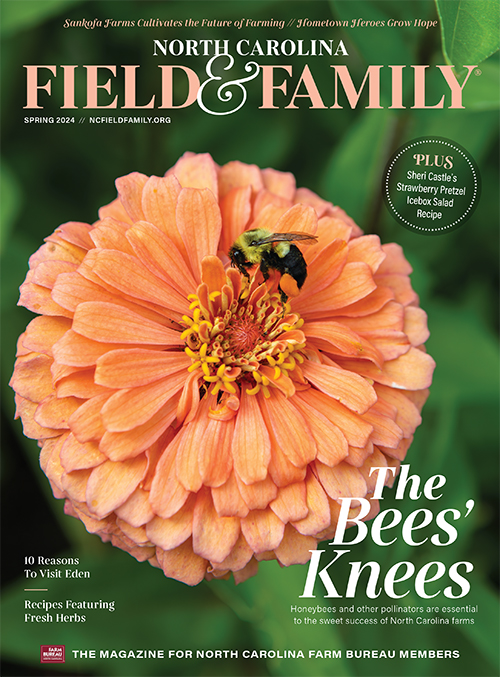Busy Bees: Farmers and Beekeepers Work Together
Farmers and beekeepers keep a close relationship to help protect pollinators and honeybees.
Rachel Stroop |As you browse the produce aisle of your local grocery store this season, keep in mind that the bins overflowing with fresh blueberries, juicy watermelon, ripe squash, crisp cabbage, vibrant green beans, refreshing cucumbers and more would be empty without buzzing honeybees.
Many consumers think of the tiny insects as simply honey providers or picnic pests, but in reality, these pollinators are crucial to providing one-third of the food we eat every day.
“If you don’t have ample pollination, the quality of the crops is unacceptable,” says Dick Tunnell of Hyde County. Tunnell has been operating Tunnell Farms with his family since 1975. Tunnell says honeybees are extremely important for his livelihood as a produce farmer, especially because his farm sells wholesale to major chain stores in the Northeast. Tunnell grows 2,000 acres of wheat, field corn, cotton and soybeans, along with lots of produce for the fresh market, including sweet corn, cucumbers, cabbage, snap beans, squash and watermelon. He works with his wife, Sandra, and son, David – who mainly takes care of the watermelon crop. The farm is family-owned-and-operated.
“Our produce has to be pretty. It can’t be misshapen if the stores are going to purchase it,” Tunnell says. “We depend on pollinators for this. If there aren’t enough bees in the spring, our squash crop might be cut in half.”
To make sure his crops thrive, Tunnell receives guidance from a local beekeeper, Wayne Rose.
Help Beyond Honey
Rose owns Crossroads Honey Farm Inc. in Roper. In the early 1970s, he began producing honey, and still does, but as the need for pollination became more prominent, his focus shifted. Pollination is now his main job, with an inventory of close to 1,500 hives.
“Dick Tunnell was one of the first farmers I worked with when I started pollinating, somewhere around 1987,” Rose says.
When the time is right, Rose brings his hives to Tunnell’s fields and moves them where they need to be.
“I tell Dick where the bees need to be moved, and he lets me know when he needs them,” Rose says. “We’ve never had a written contract. I don’t have one with any of my farmers. It’s just a very good relationship.”
Along with Tunnell, Rose works with about 38 farmers, and he says the relationships he has made have all been through word of mouth.
“Dick and I have become close friends,” Rose says. “We’re both Farm Bureau members, and after I started a pollinating business, Dick helped me get contracts with two or three other farmers. I’ve never advertised for pollination.”
He adds that produce is the main type of crop needing pollination – especially blueberries– but even cotton and other row crops can benefit from honeybee pollination.
“It really does help improve cotton,” Rose says.
Working together has shown both Rose and Tunnell the importance of a solid relationship between farmers and beekeepers, as well as the importance of educating consumers on how this affects their food supply.
“We’re losing bees at a high rate, and we can’t really predict where the problem is,” Rose says. “We need to make the public aware that bees are out there and they’re good. If not for honeybees, our produce crop industry in North Carolina would not survive.”
Tunnell agrees. “I’m not a bee man, but I know we need them,” he says. “If we don’t have honeybees, we’ll be out of business.”
Buzzworthy Tips
For consumers with their own vegetable gardens, Rose says knowing exactly what they’re putting on in terms of insecticides can help protect and maintain the honeybee population. Insecticides can kill all insects, including good ones such as pollinators. Certain pesticides and insecticides now contain labels that warn if it will also kill pollinators.
Rose emphasizes that for everyone, grower or not, word of mouth is one of the greatest advocates for saving honeybees.
“Everything that has been coming out in the news about honeybees and their decline is one of the best things that can happen,” he says. “The public is so much more aware.”
– Rachel Bertone






Do you sell your honey in Roper?